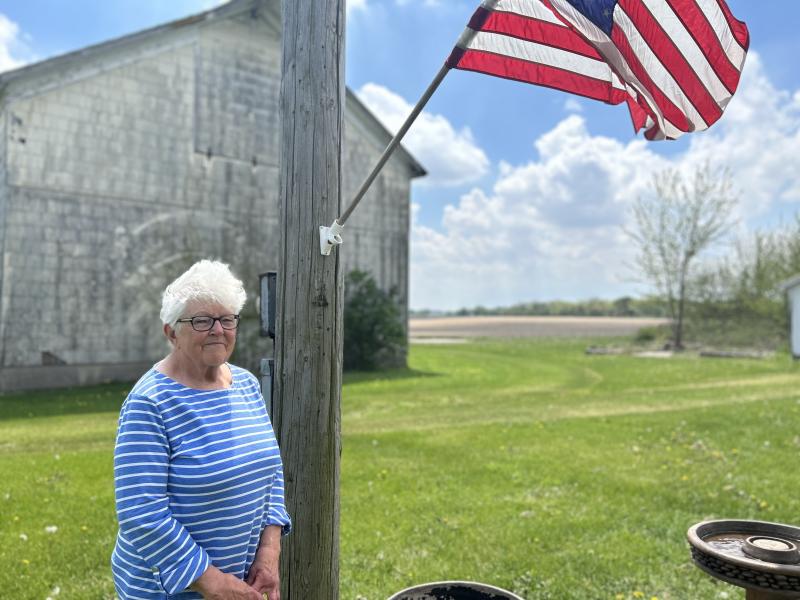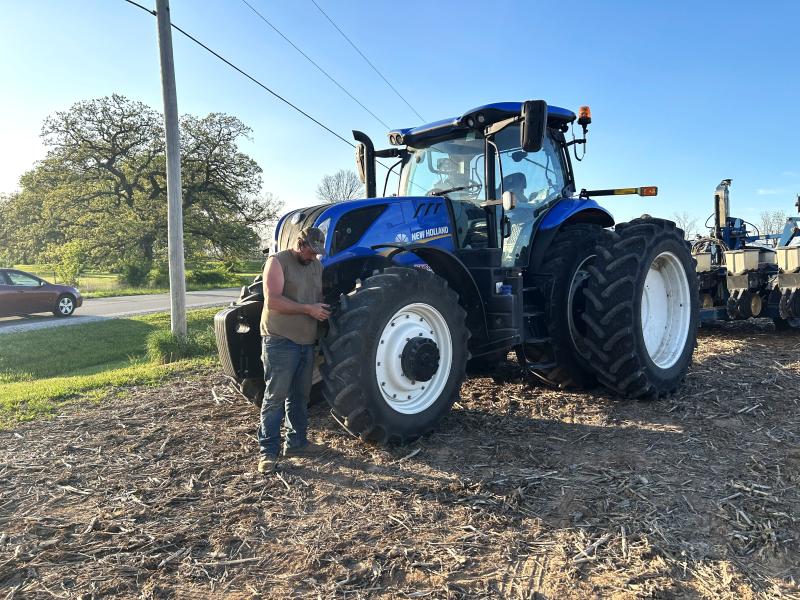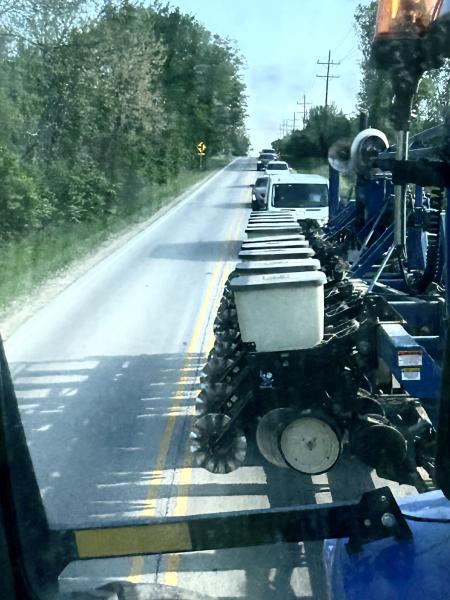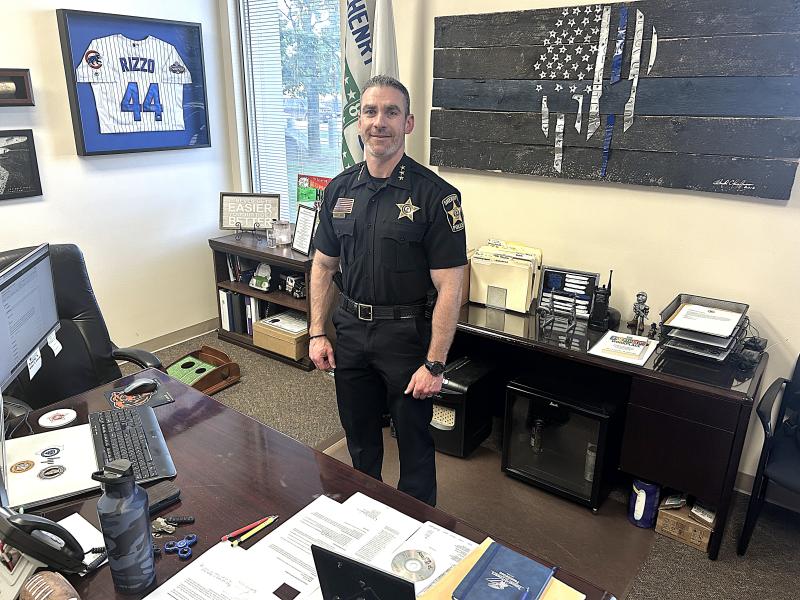By Mike Orso
Many McHenry County farmers might not need to transport planters on county roads soon, as most soybean, corn and other seed sowing draws toward a close. But, it’s time to cut and bale hay to be used for animal feed. So, expect to see slow-moving tractors with balers and maybe wagons and trucks hauling square or round hay bales from fields to farms. Some organic farming requires field tillage between planted rows and plants to control weeds, so tractors with field cultivators can be encountered on roads and even some suburban avenues. Self-powered, or sprayers powered and hauled by tractors that also help control yield-robbing weeds and insects need to be transported. Come mid-summer and fall, many farmers need to move the large, box-like harvesters known as combines on county roads to harvest grains and oilseeds.
It was about 14-years ago when Harvard-area farmer Mancel “Butch” Beard, 66, needed to haul a sprayer a few miles from the family’s farm to a nearby field. His tractor and sprayer had the required orange-and-red-triangled slow moving vehicle (SMV) signs. He used flashing lights as an extra precaution to motorists. Bridge repair on Dunham Rd. required a detour, and when he steered his International 560 tractor with the attached sprayer to make a lefthand turn, he was struck by a rapidly moving car attempting to pass.
“She just clipped his tractor, but it was enough to throw it off balance,” said Jeanne Beard, Butch’s wife, of the motorist who struck him. “He had the steering wheel in his hand, he ended up in the ditch, face down. The tractor rolled over on him and came upright in the field.”
Butch Beard died later that day at Mercyhealth Hospital and Medical Center in Harvard. Jeanne and their three sons, Charlie, Dan and Jim, buried him five days later in the town’s Mt. Auburn Cemetery. The incident proved once again why farming remains one of the most dangerous of all occupations.
“They had closed the bridge on Dunham Rd.,” said Jeanne. “He didn’t go that route and went straight and made a lefthand turn. And that’s when he got killed.”
Illinois’ “Rules of the Road” notes farm and other certain SMVs, construction equipment and animal-drawn vehicles may share the roadways. It requires you and other motorists to:
• Use caution and prepare to slow down when approaching and passing slow-moving vehicles from the rear
• Pass only when safe and legal to do so
• Be certain that the SMV operator knows your presence and intent to pass before beginning the maneuver.
Woodstock farmer Chris McKee has routinely seen motorists violate single and double-striped no passing zones. Thus far this year, it has been no different.
“We’ve had people pass going up a hill,” said McKee, president of the McHenry County Farm Bureau. “I’ve seen the car passing me and then almost hitting an oncoming car and then ending up in the ditch on the opposite side of the road.”
Stopping farm equipment on roadways or pulling over toward ditches can often be dangerous for those operating it as well as for motorists.
“I’ve had people stop and yell at me when I’ve gotten to where I’m going and I’ve just said, ‘Hey, everyone needs to take their time, slow down,’” he said. “’If you end up dead, you’re never going to make it there.’”
The McHenry County Sheriff’s Office patrols the county’s unincorporated areas. Sheriff Robb Tadelman emphasizes the importance of motorists slowing down when encountering farm and other SMVs on roads and ensuring that operators know of your presence before attempting to pass in legal sections of roadways.
“Sometimes they have to take wide turns where they have to go almost to a ditch line to the right to make it into a field to the left,” said Tadelman. “Just be cognizant of those vehicles and how they are moving.”
The sheriff notes while most rural areas exist in the western and northern sections of the county, farm and other SMVs can be encountered just about anywhere.
“If you are moving too fast on the roadway, then you should’ve left earlier and it’s not someone else’s fault for your lack of timeliness,” he said. “A good portion of the commerce that comes from McHenry County comes from our farming community. They are an integral part of this community.”
Jeanne Beard, 81, said her husband Butch was impeccably organized, always knew where a piece of farm equipment or tools had been stored, and would always find some association with numbers.
“We were born in 1944, so he picked our wedding date, 4-4-64,” she said. “He was good in math, that’s why his boys are.”
In fact, in his father’s honor, Jeanne and Butch’s youngest son Jim, 45, share these facts and numbers:
• 60 miles per hour (mph) = 1 minute per mile
• 20 mph = 3 minutes per mile, or an extra 2 minutes per mile to travel at the reduced speed.
“The reality is that my dad had less than 100 feet to go before being clear of the car’s way, and at 60 mph the car was going 88 feet per second,” said Jim Beard. “Therefore, all that was to be gained was one second. But nothing was gained. Instead, one second took the past 14 years of time with my dad away from my family and me.”
Jim Beard believes an extra 2 minutes per mile equals an infinite amount of health and safety.

Jeanne Beard at home with a photo of her and her late husband Butch, who was killed in a road accident in July 2011 at age 66. "Our son Dan's father-in-law died suddenly three years before Butch at the age of 66. A friend over on (Route) 23, his wife died unexpectedly at 66. This drove Butch nuts. We were 65, and he goes, 'If we can just get to 67.' He would've been 67 at the end of August. I'll set my furnace, unconsciously. I never leave it at 66. I put it at 65 or 67, I won't do 66."

Jeanne Beard manages the farms near Harvard where she and her husband, Mancel "Butch" Beard raised three sons, Charlie, 57 of Stanwood, Wash., Dan, 53 of Findlay, Ill., and Jim, 45 of Columbus, Wisc. The couple met at Harvard High School in 1962 and were married in 1964.

Woodstock farmer Chris McKee with his tractor and planter not far from Kishwaukee Valley Rd. "It can be terrible, it is probably the most dangerous road we are on," said McKee of the road that crosses northern McHenry County. "You have stretches with S-curves where people like to pass, and hills. It can be aggravating."

"Twice this year, people have had to stop and fall back in before they caused a wreck," said Woodstock farmer Chris McKee as he has transported his family's farm equipment on McHenry County roads. (Photo by Chris McKee)

McHenry County Sheriff Robb Tadleman at his headquarters office in Woodstock. "If you are driving on a roadway, part of your responsibility is to understand what is on that roadway and being able to properly react and know the rules of the road," he said. "The reality is it comes down to just like everything else when we have traffic crashes, speeding or whatever, people aren't paying attention, people are in a hurry."
